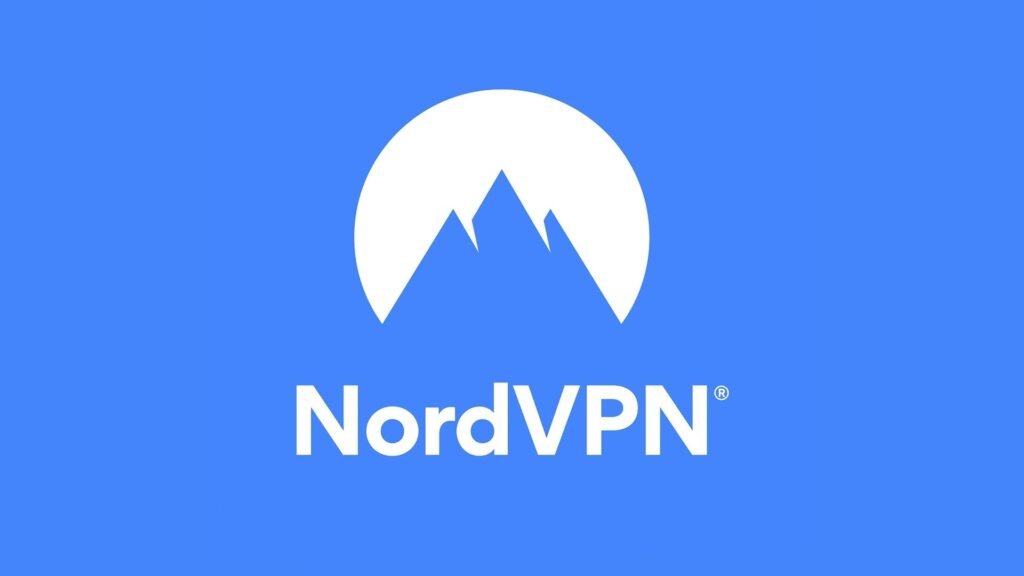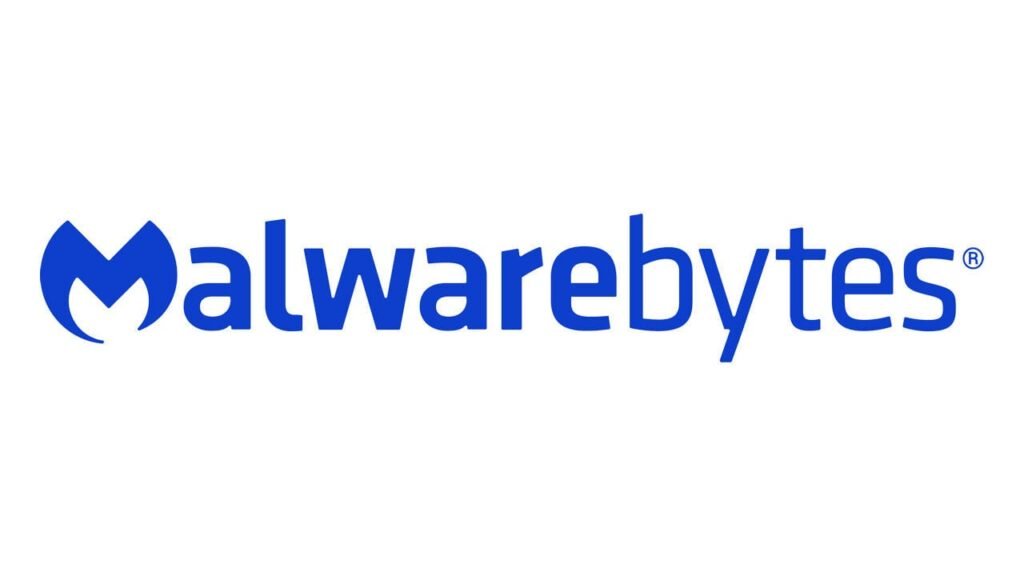Did you know nearly 1 in 5 Americans have fallen victim to online fraud1? Online shopping and banking bring us convenience, but they also come with risks. With 78% of online shoppers worried about data theft1, it's vital to know how to stay safe.
From identity theft to financial scams, the dangers are real and on the rise. That's why learning the best ways to shop and bank online is key. This article will give you tips, secure payment methods, and ways to protect your online banking from fraud.
Key Takeaways
- • Understanding online shopping risks is essential for fraud prevention.
- • Always prioritize secure payment options when making online purchases.
- • Online banking security requires proactive measures.
- • Be aware that public Wi-Fi can compromise your financial safety.
- • Regular monitoring of accounts helps detect suspicious activities early.
Understanding the Risks of Online Shopping and Banking
It's key to know about online shopping and banking to stay safe. Online scams, identity theft, and other threats are common. In 2023, online payment fraud cost over $48 billion worldwide, showing we must be careful2.
Many trust their instincts to spot scams, with 79% believing their gut feelings are right3. Yet, only a few in the U.S. protect their computers well. This shows how crucial good cybersecurity is for keeping our money safe4. Also, 91% of shoppers look for secure internet when shopping online, showing they're aware of the dangers3.
Cybercriminals use tricks like “bait and switch” scams to trick shoppers4. With identity theft getting smarter, 86% of buyers rely on customer reviews to make choices3. Keeping personal info safe is a top priority for 94% of shoppers3.
Shopping on public Wi-Fi can make you a target for hackers2. So, it's important to shop safely online. Keeping an eye on your accounts and setting up alerts can help spot fraud early2.
Best Practices for Safe Online Shopping and Banking
In today's digital world, keeping your online transactions safe is key. By following good practices, you can avoid scammers and stay safe online. Start by choosing reputable websites to lower your risks. Look for sites with a HTTPS URL, which means they're secure. Shopping with well-known brands helps build trust and makes online shopping easier.
Choosing Reputable Websites
Always shop on websites with a good reputation. Make sure the site is secure before you buy anything. Check for HTTPS and a padlock icon in the address bar. This keeps your personal info safe. Be cautious of deals that seem too good to be true, as they might be scams5.
Reading Customer Reviews
Another important step is to read reviews from other shoppers. Reviews can tell you if a store is reliable or not. Look for patterns in reviews, especially any complaints about delivery or service. A good website will have a mix of positive and negative feedback. For more tips, check out Webroot's security advice6.
Recognizing Secure Payment Options
When you shop online, it's key to know the secure payment options. This helps keep your financial info safe. PayPal is a top pick because it adds extra security and keeps your details private.
Always check if a website supports secure payments. Look for “https://” in the URL to see if it's encrypted. Credit cards are safer than bank transfers for online buys, as they cap your loss at $50 for unauthorized charges7.
Using credit card features like card controls can also help. You can set limits and freeze your card if needed. This boosts security and lets you shop online without worry. With online spending hitting a record $1.3 trillion in 20228, using safe payment methods is more important than ever.
Choosing secure payment options keeps your online buys safe. This lets you enjoy shopping without worrying about security. Remember, use trusted payment services and stay alert for scams.
Always put security first when shopping online to safeguard your personal and financial information.
Importance of Using Credit Cards
Using credit cards for online shopping and banking is wise for financial safety. They come with fraud protection, shielding you from unauthorized buys. Most major issuers offer zero-liability protection, so you won't be blamed for fraud if you report it fast9. Federal law caps your liability at $50 if you report fraud within 60 days9.
Credit cards let you dispute unauthorized charges, a security credit cards have that debit cards don't. This is key when doing online transactions, where risks are higher. They also give peace of mind and rewards, like points or cash back on purchases. You can earn up to 8% or more back on certain spending10.
Credit cards also have a grace period before you must pay. This lets you manage your money better and avoid interest if you pay on time11. Plus, rewards can help you get points for travel or other buys, showing the economic perks of using them right.
Yet, credit cards have risks, like high-interest rates over 20%11. To stay financially healthy, use your card wisely. Keep your balance under 30% of your limit to keep a good credit score11. Using credit cards smartly protects your money and offers rewards and protections.
Staying Updated with Security Software
To keep your devices safe, you need to update your security software and browsers often. Regular updates, like browser updates and new antivirus solutions, are key to strong cybersecurity. These steps fix vulnerabilities and protect you from online threats, especially when shopping online.
Why You Should Update Your Browser
Updating your browser is crucial because it fixes security issues and keeps you safe from new threats. Chrome, for example, warns you when you're about to visit a non-secure site. This way, you know about potential dangers. If you don't update, you risk falling victim to data breaches that target your financial info12.
Benefits of Antivirus and Anti-Malware Solutions
Using strong antivirus and anti-malware software boosts your security. These tools find and stop malware, which can harm your device or let hackers in12. They also protect you from phishing scams that try to steal your personal info through emails or fake sites13. Keeping your software up to date is essential for safe online banking and shopping13.
Password Management Techniques
Keeping your passwords safe is key to protecting your online world. Using unique passwords can greatly lower the chance of someone getting into your accounts without permission. Here are some tips to help you stay safe.
Creating Strong, Unique Passwords
It's important to make strong, unique passwords for all your online accounts. Try to use at least 16 characters, mixing in letters, numbers, and symbols. This makes your password harder to guess14. Don't use simple words or personal info like birthdays or pet names, as hackers can easily find out15.
Make sure to use strong passwords for important accounts like email, bank, and health services15.
Using a Password Manager
Password managers are great for keeping your passwords safe. They let you remember just one master password, while they handle the rest15. These tools can create strong passwords, spot weak ones, and even fill in login info for you, making your online life safer15.
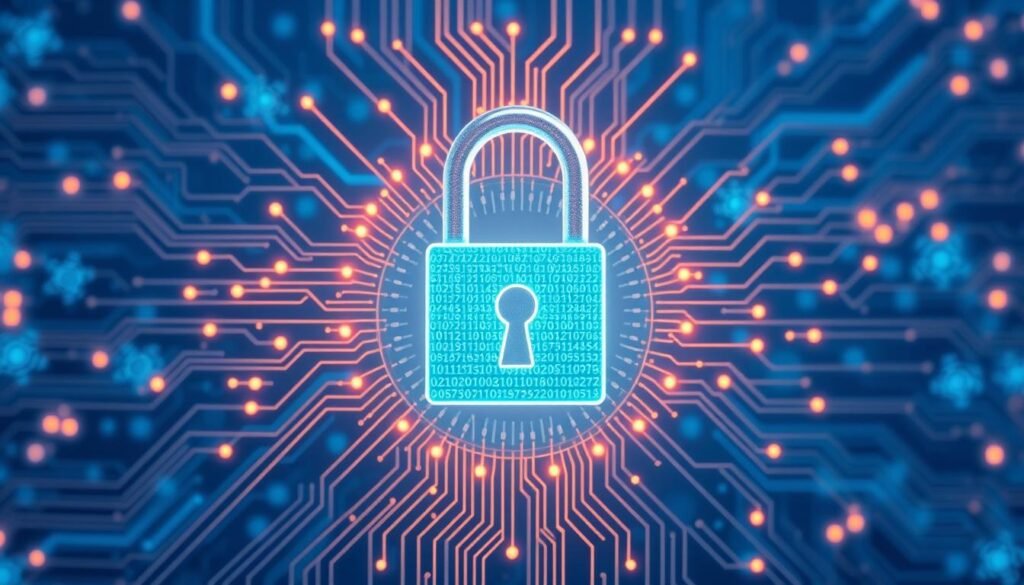
Free options like 1Password, Bitwarden, and KeePass are highly recommended14.
Using a password manager makes managing your passwords easier and safer. It stops the problem of using the same password everywhere, which can lead to big security issues15. Adding Multi-Factor Authentication (MFA) adds an extra layer of security, making it harder for hackers to get in14. Always be on the lookout for signs that your passwords might have been stolen and act fast if you think something's wrong16.
| Password Length | Complexity Factors | Password Manager Benefits |
|---|---|---|
| At least 16 characters | Upper & lower case letters, numbers, special characters | Secure storage for passwords |
| Enforce strong requirements | Avoid common phrases and easily guessable information | Auto-fill login details |
| Unique for every account | Regularly update passwords | Generate complex passwords |
Avoiding Phishing Scams and Fraudulent Emails
Phishing scams are a big problem, looking like real messages from banks and government. They can trick you if you're not careful. Scammers use urgent language and fake website addresses to trick you1718.
Identifying Suspicious Emails
Start by spotting suspicious emails. Look for generic greetings, unexpected attachments, and fake links. Banks never ask for your personal info in emails or calls1918.
If an email asks for your info quickly, be cautious. Always check if it's real before giving out any info1918.
Best Practices for Email Security
Keeping your email safe is key to avoiding fraud. Don't click on strange links or open attachments from unknown sources. Use multi-factor authentication to secure your accounts1918.
Check your account statements often and tell your bank about any strange transactions right away1918.
Stay up-to-date with new scams and keep your software current. Scammers change their tricks often, so knowing the latest scams is your best defense1719.
Using Two-Factor Authentication for Extra Security
Two-factor authentication (2FA) is key to keeping your online accounts safe. It adds an extra step after entering your password. This makes it much harder for hackers to get into your account. In 2021, a big jump was seen, with 79 percent of people using 2FA, up from 53 percent in 201920.
Experts say to turn on 2FA whenever you can. It's great for keeping your financial info safe, which most people worry about. In fact, 93 percent of folks want to protect their money from hackers21.
There are a few ways to get 2FA. You can get a code via text or email, or use an app like Google Authenticator. Each has its own good points and things to think about. For example, SMS codes stop 96 percent of big phishing attacks, but some say they're not as safe as other options2022.
Using 2FA can sometimes be a bit of a hassle. But, 74 percent of companies have heard complaints about it20. Still, it's a vital step to take, especially for important stuff like banking and social media. By using 2FA on key accounts, you make your online world safer and more secure.
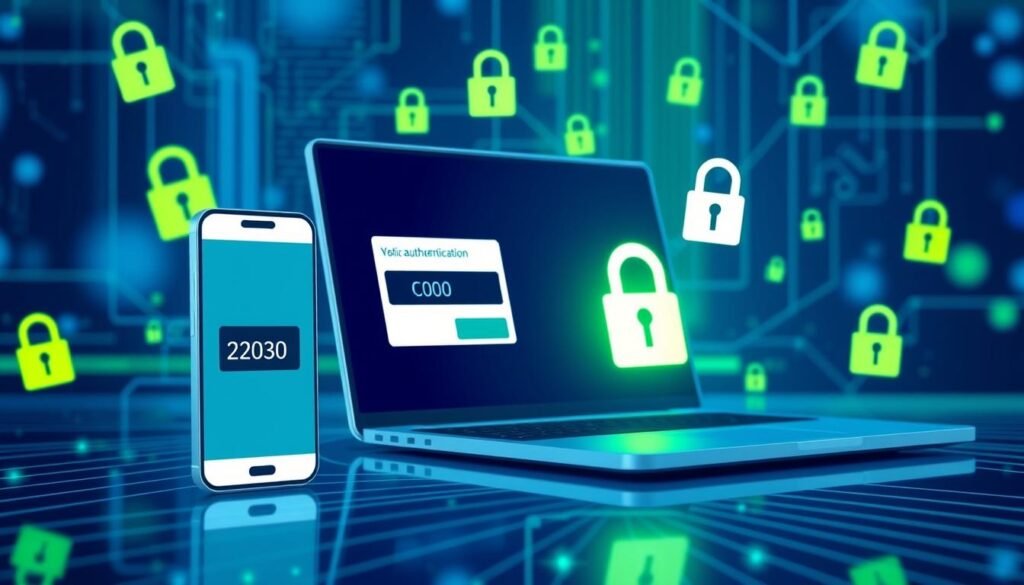
Ensuring Data Privacy with Secure Websites
When you're online, keeping your data safe is key. Look for HTTPS security on websites. It keeps your info safe as it moves around. Privacy policies are also important. They tell you how your personal info is used and shared.
Identifying HTTPS vs. HTTP
Always check for HTTPS in web addresses. Sites without HTTPS are risky. HTTPS adds a security layer23.
Secure sites start with https://. Non-secure ones start with http://. This small change is big for your safety online.
Understanding Privacy Policies
Privacy policies are key. They explain how websites handle your data. Knowing these policies helps you decide what info to share.
In 2021, over 54% of companies didn't have a disaster recovery plan24. Be cautious of sites without clear privacy policies. They might not care about your data.
Make sure privacy settings on apps and websites are set right. This helps control tracking and sharing of your data24.
| Aspect | HTTP | HTTPS |
|---|---|---|
| Data Encryption | No encryption | Encrypted data transmission |
| Security Level | Low | High |
| User Trust | Lower trust score | Higher trust score |
| Cost | N/A | Varies based on provider |
To wrap it up, always choose sites with HTTPS. And always read the privacy policies to keep your data safe25.
Safe Connectivity Practices while Shopping
Shopping online requires secure connectivity to protect your data. Public Wi-Fi risks are high, as it can expose your sensitive info to hackers. Free Wi-Fi might seem tempting, but it can lead to serious security issues.
Avoiding Public Wi-Fi for Transactions
Using public Wi-Fi for online transactions can put your data at risk. Hackers might intercept your data, especially if they create a fake sense of security. It's important to know this to keep your data safe.
Using Virtual Private Networks (VPNs)
VPNs are a great way to protect yourself from public Wi-Fi risks. They encrypt your internet connection, adding a layer of security. With VPNs, you can shop and bank online safely, even in public places.
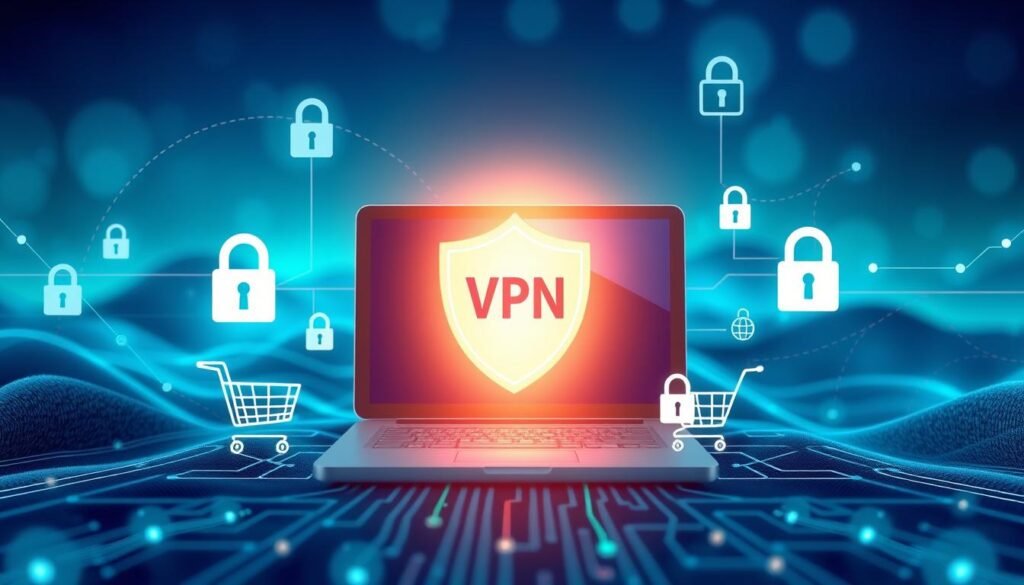
VPNs are powerful tools for keeping your data safe. They protect your sensitive information when you shop, bank, or browse online. This is crucial as cyber attacks on online shoppers are increasing2627.
Online Shopping on Mobile Devices
Shopping on mobile devices is convenient, but keeping your info safe is key. It's important to only get apps from trusted places and manage their permissions well.
Downloading Apps from Trusted Sources
Always get your shopping apps from places like the Apple App Store or Google Play Store. These places check their apps to keep you safe. But, not everyone protects their computers well28. So, choosing where to download apps is very important for your safety.
Managing Permissions in Shopping Apps
When you install apps, watch what permissions they ask for. Know which ones are needed and which might risk your privacy. Only share info that's really needed for the app to work. This keeps your bank details and passwords safe.
Also, check the app's privacy policy before you download it29. Using your device's security features, like passcodes or biometrics, is a good idea too.
| Best Practices for Mobile App Usage | Details |
|---|---|
| Download from Trusted Sources | Use Apple App Store or Google Play Store to avoid harmful software. |
| Review Permissions | Only grant permissions that are necessary for the app’s functionality. |
| Lock Your Screen | Utilize passcodes, patterns, or biometrics to secure your device. |
| Stay Updated | Regularly update your mobile device software for security patches. |
By following these tips, you can make your mobile shopping safer. This way, you can enjoy buying your favorite things without worry29.
Monitoring Your Accounts for Suspicious Activity
Keeping an eye on your accounts is key to keeping your money safe. By being proactive, you can catch fraud early. This way, you can rest easy knowing your finances are secure.
Setting Up Transaction Alerts
Transaction alerts are a smart way to track your money. They let you know right away when someone makes a purchase or withdrawal. This is especially important since about 50% of online shoppers have fallen victim to cybercrime30.
These alerts help you spot fraud quickly. This way, you can act fast to protect your money.
Reviewing Bank Statements Regularly
Checking your bank statements often adds an extra layer of protection. Look for any charges or transactions that don't seem right. This can help you catch fraud early and avoid big losses.
Remember, hackers often target outdated software. Regularly reviewing your statements helps you stay ahead of them. If you see something odd, act fast to prevent bigger problems30.
Using transaction alerts and checking your statements regularly can keep your money safe. These steps are crucial for protecting your finances online.
“Monitoring your accounts is not just a safety net; it's a crucial shield against the many threats you face online.”
| Alert Type | Description | Benefit |
|---|---|---|
| Email Alerts | Receive notifications for any account activities directly to your email | Immediate awareness of transactions |
| SMS Alerts | Instant texts for real-time transaction updates | Quick response to unauthorized actions |
| Mobile App Notifications | Alerts through your banking app | Convenient and accessible monitoring |
Being informed and watchful about your financial activities can greatly reduce fraud risks. This makes online shopping and banking safer for everyone31.
Conclusion
Keeping your online shopping and banking safe is key in today's digital world. Using strong passwords, updating software, and being careful with personal info helps a lot. One security company blocked 161 billion cyber-threats last year, showing how big the problem is32.
Being careful online is very important. Check your bank statements often and set up alerts for transactions. This helps catch fraud early33. Also, knowing about new threats and how to avoid them helps you stay safe, especially on public Wi-Fi34.
By focusing on security and using tools for identity protection, you can shop online safely. Remember, you are the one who can keep your info safe from online risks.


